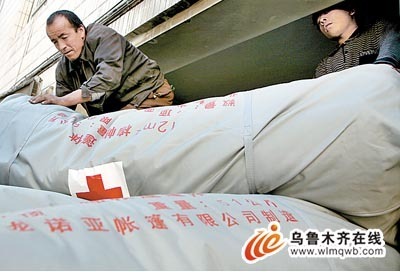Quake-hit Wuqia County, a mountainous area in the far west of China's Xinjiang Uygur Autonomous Region, was hit by an early winter when the first snowfall on Tuesday left more than 400 families in the cold, local authorities said.
 |
|
The Red Cross Society of the Xinjiang Uygur Autonomous Region allocates commodities valued at about 130,000 yuan to its Wuqia County which was hit by an early winter when the first snowfall on Tuesday left more than 400 families in the cold. (Photo on October 10)
|
After several days of rain, the snow began to fall early on Tuesday, lowering the temperature to minus 3 to minus 4 degrees Celsius in the 7,800-square-km quake zone, according to the county meteorological station.
"My house has cracks and I dare not live inside any more," said herdsman Muzhali, who built a yurt in the courtyard in Ulugqat, one of four towns hit by the quake. The cold draft blew in from almost everywhere, leaving his wife with a cold.
"We need a cotton tent," said Tursun, 58, holding a three-month-old baby in her arms. Her family and another 20 villagers crowded in a temporary yurt without enough room to light a fire.
A 6.8-magnitude earthquake jolted the county on the evening of Oct. 5, affecting 7,645 people. More than 700 houses suffered structural damage, while four collapsed. No casualties were yet reported.
As of noon Tuesday, the quake-hit zone had received donations of 700,000 yuan (about US$103,00), 100 tents, 300 quilts and 500 clothes, which were far from enough, said Fan Baojun, the county's Communist Party chief.
"We still need more than 400 tents, 400 tonnes of flour, 1,200 tonnes of coal and 600 tonnes of animal feed for the winter," he said.
The quake zone stands about 2,700 meters above sea level in the Pamirs mountain range. It is bout 100 km from the county seat of Wuqia at the conjunction of the south of the Tianshan and Kunlun mountains.
The regional earthquake monitoring network had observed 1,237 aftershocks as of 10 p.m. Monday, with the largest 5.9 on the Richter scale.
More than 30,000 people were dispatched to help build houses and investigate the losses caused by the quake. The county seat was more than 1,500 km from Urumqi, the regional capital. Poor traffic conditions and telecommunications made it difficult to transport supplies from outside.